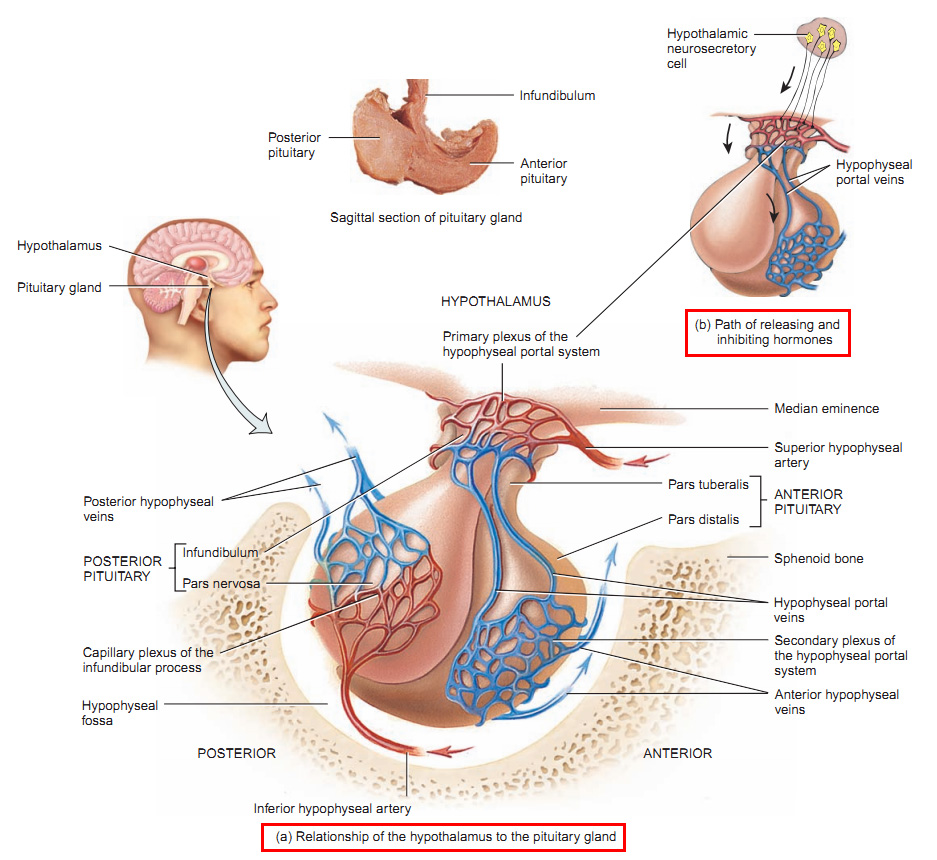Endocrinology of the Hypothalamus and Pituitary Gland

The hypothalamus, located just below the Thalamus and the 3rd ventricle, is controlling everything involved with the pituitary gland. The hypothalamus is linked to the pituitary gland by both nerve fiber tracts and a profuse network of capillaries called the hypothalamic-pituitary portal system (aka hypophyseal portal system).
Look at the pathway of the blood in the picture below: On the hypothalamus, blood flows from the arteries (in red) to the anterior lobe of the pituitary gland. This is how neurotransmitters are carried from the hypothalamus to the pituitary.
Functions of the Hypothalamus
a) Visceral Reflex Centers
- Thermoregulatory Reflex Center (regulates body temp)
- Appetite/Satiety Reflex Centers (regulates blood sugar level)
- Osmoregulatory Reflex Center (“thirst;” regulates salt & water balance/tonicity of body fluids)
b) Modulates the activity of lower visceral reflex centers:
- Cardiovascular Reflex Center (Blood pressure) (found in M.O.)
- Swallowing & Vomiting Reflex Centers (found in M.O.)
- Micturition Reflex Center (in spinal cord)
- Defecation Reflec Center (in spinal cord)
c) Adjusts the activity of the various visceral organs to match the physical activity and energy requirements of the person (via descending autonomic fiber tracts and the autonomic motorneurons).
d) The nerve cells in the hypothalamus secrete two neurotransmitter hormones that are actually stored in the cells of the neurohypophysis. The posterior lobe of the pituitary gland is called the neurohypophysis. (Called “neuro” because it’s simply an extension of hypothalamus!). The 1955 Nobel Prize in Physiology & Medicine was awarded to Vincent du Vigneaud for identifying these 2 neurotransmitter hormones that are stored in the neurohypophysis. The neurohypophysis does not synthesize hormones, it stores and releases these two hormones that come from the hypothalamus:
- Anti-Diuretic Hormone (ADH): A collection of neurons release Anti-Diuretic Hormone (ADH; Vasopressin) when our body fluids become hypotonic, which makes the kidneys retain water rather than excrete. It’s obvious in the name, right? If a diuretic is what makes you excrete water and go pee, an anti-diuretic hormone does the opposite of that function. If you are hypotonic, eating “salt” for example would make you more isotonic, and the kidney can start to release fluid to create urine.
- Oxytocin: Another collection of neurons known as the parturition milk-let down center release oxytocin into the blood stream. It causes milk-let down (lactation) and uterine contractions. The word parturition comes from the latin word parturient, which means “about to give birth.” These neurons are wired into the limbic system as well, so you could see how emotions can affect the release of these hormones!
e) The nerve cells in the hypothalamus cause the secretion of Releasing Hormones that are actually stored in the cells of the adenohypophysis. The anterior lobe of the pituitary called is called the adenohypophysis. “Adeno” means gland and it is a true endocrine gland made of cuboidial epithetial cells. Remember the hypothalamus and adenohypophysis are connected by a collection of blood vessels that connect to each other and are called the hypophyseal portal system. (look at the first picture at the very top of this page to refresh your memory). When the hypothalamic neurons release neurotransmitters, they are carried through this system to the adenohypophysis. The hypothalamic neurons are controlling the adenohypophysis by neurotransmitters called releasing hormones (RH’s). These neurotransmitters are called releasing hormones cause they cause the subsequent release of hormones in the adenohypophysis. Capiche?
The hypothalamus releases the following Releasing Hormones that stimulate the release of different hormones from the adenohypophysis:
- Corticotropin Releasing Hormone (C.R.H. causes the release of ACTH)
- Thyrotropin Releasing Hormone (T.R.H. causes the release of Thyroid Stimulating Hormone aka Thyrotropin)
- Gonadotropin Releasing Hormone (GnRH releases LH and FSH.)
- Growth Hormone R.H. & Growth Hormone I.H.
- Prolactin R.H. & Prolactin I.H.
Now let’s explore what hormones are secreted by the adenohypophysis as a result of these releasing hormones secreted by the hypothalamus: Hormones secreted by the anterior pituitary gland (the adenohypophysis).






